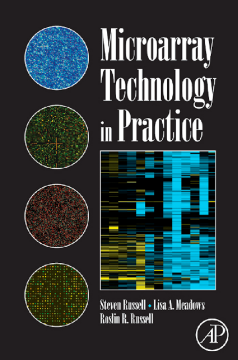
Additional Information
Book Details
Abstract
Using chips composed of thousands of spots, each with the capability of holding DNA molecules corresponding to a given gene, DNA microarray technology has enabled researchers to measure simultaneously gene expression across the genome. As with other large-scale genomics approaches, microarray technologies are broadly applicable across disciplines of life and biomedical sciences, but remain daunting to many researchers. This guide is designed to demystify the technology and inform more biologists about this critically important experimental technique.
- Cohesive overview of the technology and available platforms, followed by detailed discussion of experimental design and analysis of microarray experiments
- Up-to-date description of normalization methods and current methods for sample amplification and labeling
- Deep focus on oligonucleotide design, printing, labeling and hybridization, data acquisition, normalization, and meta-analysis
- Additional uses of microarray technology such as ChIP (chromatin immunoprecipitation) with hybridization to DNA arrays, microarray-based comparative genomic hybridization (CGH), and cell and tissue arrays
